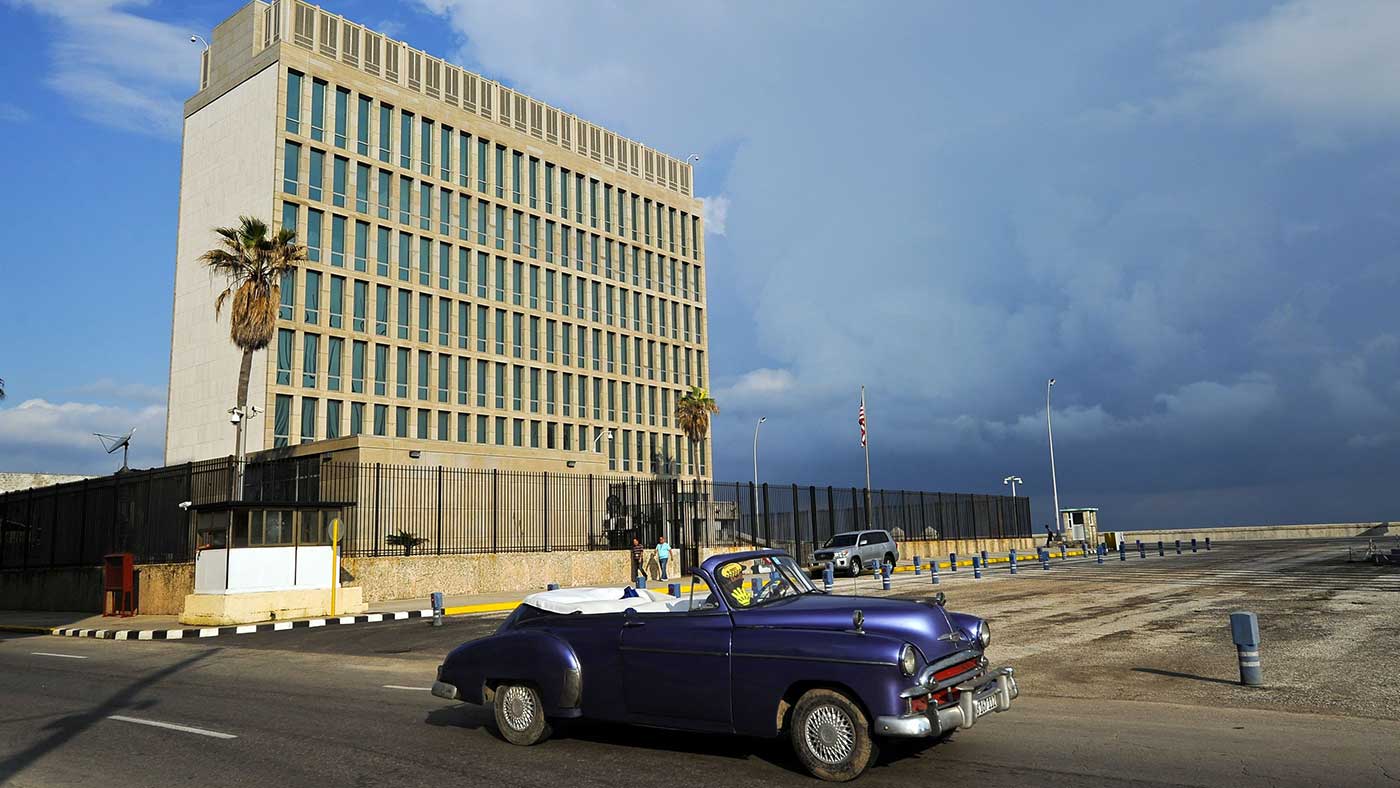US may close Cuban embassy over ‘sonic attacks’
At least 21 US diplomats complain of hearing loss, slurred speech

A free daily email with the biggest news stories of the day – and the best features from TheWeek.com
You are now subscribed
Your newsletter sign-up was successful
The US may close its embassy in Cuba following a series of sonic attacks that left several of its diplomats in need of medical treatment.
At least 21 US diplomats have complained of physical symptoms including hearing loss, dizziness and slurred speech since late 2016. Separately, at least five Canadian diplomats’ families stationed in Havana reported similar symptoms, with some requiring hospitalisation. All of the Canadians are reported to have recovered.
Speaking to CBS News on Sunday, US Secretary of State Rex Tillerson said: “It’s a very serious issue with respect to the harm that certain individuals have suffered.”
The Week
Escape your echo chamber. Get the facts behind the news, plus analysis from multiple perspectives.

Sign up for The Week's Free Newsletters
From our morning news briefing to a weekly Good News Newsletter, get the best of The Week delivered directly to your inbox.
From our morning news briefing to a weekly Good News Newsletter, get the best of The Week delivered directly to your inbox.
Five Republican politicians, including Florida senator Marco Rubio, asked Tillerson to consider closing the US Embassy in Havana.
“Cuba’s neglect of its duty to protect our diplomats and their families cannot go unchallenged,” they wrote in a letter to Tillerson. The US expelled two Cuban diplomats from the US in May over the attacks.
The Cuban government continues to deny any involvement in the events, which The Guardian describes as a “mystery”. Investigators have suggested a third party might be involved, such as Russia.
Sound and health experts are also baffled by the odd array of physical complaints suffered by the diplomats. Joseph Pompei, a former MIT researcher and psychoacoustics expert, told the Associated Press: “Brain damage and concussions, it’s not possible. Somebody would have to submerge their head into a pool lined with very powerful ultrasound transducers.”
A free daily email with the biggest news stories of the day – and the best features from TheWeek.com
Fallout from US-Cuba sonic attack widens to Canada
11 August
Canadian diplomats and family members posted to Cuba have complained of unexplained hearing loss and headaches believed to be linked to "sonic emissions" in a widening international scandal.
The report in Canada's Globe and Mail newspaper comes after reports in the US that American diplomats in Cuba suffered hearing loss in the autumn of 2016. Some were forced to return home because of their symptoms.
A months-long US investigation found that a group of American diplomats were attacked with an advanced sonic weapon that operated outside the range of audible sound. It was emitted either inside or outside their homes, according to a report by The Associated Press.
Canada established diplomatic relations with Cuba in 1945 but Ottawa did not say when its diplomats complained of hearing loss. Global Affairs Canada says it's working with the US and Cuba to determine the cause of the strange symptoms.
Former Canadian ambassador to Cuba James Bartleman told the Globe and Mail that he wasn't surprised by this week's reports, given his experience as envoy from 1981 to 1983.
Halfway through his posting, Bartleman said his family dog was poisoned, a trade officer had a dead rat nailed to his door and the embassy started receiving threatening phone calls.
"I called up the Foreign Ministry and told them to call off their goons," Bartleman told the Globe and Mail. "I went down there and I really gave them hell."
US state department spokeswoman Heather Nauert says investigations are continuing and stressed that America was not directly blaming Cuba. But she says that Cuba, as host nation to the US mission, bears responsibility for its security.
The Cuban government said in a statement that "Cuba has never permitted, nor will permit, that Cuban territory be used for any action against accredited diplomatic officials or their families, with no exception".
The Cuban foreign ministry was told about the incidents on 17 February and said it launched an "exhaustive, high-priority, urgent investigation at the behest of the highest level of the Cuban government".
A US government official told CNN that the "who, where and when point to an attack". The US is reportedly investigating whether a third country was involved as "payback" for actions the US took elsewhere and to "drive a wedge between the US and Cuba."
'Sonic attack' leads US to expel two Cuban diplomats
10 August
Washington has expelled two Cuban diplomats following a mysterious "attack" on staff in the US embassy in Havana.
Staff in the building "were subjected to an 'acoustic attack' using sonic devices that left at least two with such serious health problems they needed to be brought back to the US for treatment", CNN reports.
Spokeswoman Heather Nauert said the first of the attacks, which are said to have caused a variety of physical symptoms, including hearing loss and signs of concussion, occurred in late 2016.
Investigators are trying to determine whether Cuba "placed sonic devices that produce non-audible sound inside or outside the residences of roughly five US embassy staffers with the intent of deafening them", The Guardian says.
Havana has so far refused to comment on the reports, or the expulsion of its diplomats.
Cuba and the US reestablished diplomatic ties in 2015, following a political and economic standoff that lasted five decades.